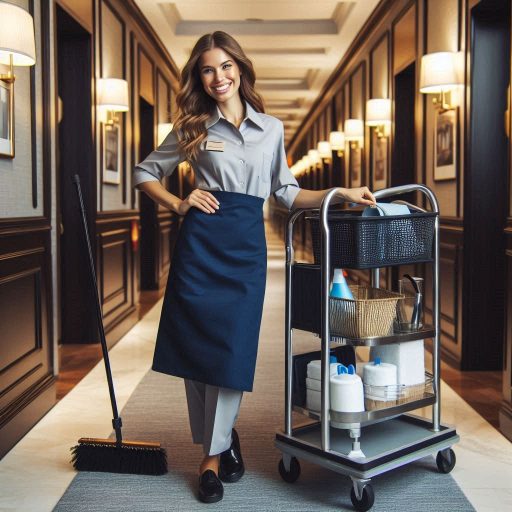Introduction
Housekeeping etiquette plays a crucial role in maintaining cleanliness and organization.
It refers to the guidelines for proper conduct in housekeeping tasks.
Following these guidelines ensures a harmonious environment in homes, hotels, and workplaces.
In homes, good etiquette promotes respect among family members and guests.
It fosters a welcoming atmosphere where everyone feels comfortable.
In hotels, proper housekeeping etiquette significantly enhances the guest experience.
Clean and organized spaces create a positive impression and encourage repeat visits.
In workplaces, maintaining cleanliness through proper etiquette boosts productivity and morale.
Employees appreciate a tidy environment, which reflects professionalism.
When housekeeping staff follow established guidelines, they minimize misunderstandings and ensure efficient operations.
Housekeeping etiquette also emphasizes the importance of communication.
When staff clearly communicate their tasks, everyone knows what to expect.
This practice helps avoid conflicts and builds trust among team members.
Adhering to housekeeping etiquette creates a sense of order.
It not only improves the aesthetic of spaces but also supports a healthy, functional environment.
By understanding and applying these principles, individuals can contribute to a cleaner and more pleasant atmosphere, no matter the setting.
Do’s of Housekeeping Etiquette
Creating a pleasant environment for guests is essential in housekeeping.
Adhering to proper etiquette not only enhances guest experiences but also maintains a positive atmosphere.
Here are the key do’s of housekeeping etiquette that every housekeeper should follow.
Always Greet Guests with a Warm Welcome
A friendly greeting sets a positive tone for the guest’s stay.
When guests arrive, a smile and a simple “Welcome!” can make a significant difference.
This gesture shows guests that you value their presence.
It also establishes an inviting atmosphere right from the start.
Make eye contact and be attentive to guests as they enter.
This connection fosters trust and makes guests feel comfortable.
Remember, first impressions matter, and a warm welcome can leave a lasting impact.
Keep Common Areas Organized and Clutter-Free
Clutter can create a chaotic environment that feels unwelcoming.
Maintaining organized common areas reflects professionalism and attention to detail.
Start each day by assessing these spaces and ensuring they are tidy.
Remove any unnecessary items from tables, counters, or seating areas.
Arrange furniture neatly to encourage conversation and relaxation.
When guests see clean and organized spaces, they feel at ease and valued.
A tidy environment also promotes a sense of respect for guests and their belongings.
Use Environmentally Friendly Cleaning Products
Choosing eco-friendly cleaning products shows commitment to sustainability and guest well-being.
Many guests appreciate a clean space that prioritizes their health and the environment.
Opt for products labeled as biodegradable or non-toxic.
These choices minimize harmful chemicals in the air and reduce environmental impact.
Inform guests about your commitment to using green products if they inquire.
This practice not only enhances their stay but also aligns with current trends in responsible tourism.
Regularly Clean and Disinfect High-Traffic Areas
High-traffic areas require consistent attention to maintain hygiene and safety.
Regular cleaning and disinfecting prevent the spread of germs and ensure guest safety.
Focus on frequently touched surfaces, such as doorknobs, light switches, and elevator buttons.
Create a cleaning schedule that emphasizes these areas throughout the day.
Utilize effective cleaning methods to ensure thorough disinfection.
Guests will appreciate your attention to detail in these crucial spots.
A clean environment promotes a sense of safety and comfort, leading to positive reviews.
Implementing these do’s of housekeeping etiquette will elevate guest experiences.
A warm welcome, organized spaces, eco-friendly products, and regular cleaning of high-traffic areas all contribute to a pleasant atmosphere.
Housekeepers play a vital role in ensuring guests feel valued and comfortable.
By following these practices, housekeepers can foster positive interactions and encourage repeat visits.
Good housekeeping etiquette not only benefits guests but also enhances the reputation of the establishment.
Embrace these principles, and watch the satisfaction of guests flourish.
Read: Educational Requirements for Childcare Workers Explained
Don’ts of Housekeeping Etiquette
Maintaining proper housekeeping etiquette ensures a clean and harmonious living environment.
Here are some essential “don’ts” to keep in mind.
Avoid Using Harsh Chemicals
Harsh cleaning chemicals can cause skin irritations and respiratory issues.
Many people may be sensitive to strong scents or irritants.
Instead, opt for natural or eco-friendly cleaning products.
Use alternatives like vinegar, baking soda, and lemon juice for effective cleaning.
This approach promotes a healthier space for everyone.
Always read product labels to understand potential side effects.
Keeping your cleaning materials safe fosters a welcoming environment.
Prioritize everyone’s well-being by choosing gentle cleaning options.
Don’t Neglect Hidden Areas
Neglecting to clean behind furniture and in hidden areas creates dust and dirt buildup.
These spaces often harbor allergens, pet hair, and debris.
Regularly check and clean these hidden spots to maintain cleanliness.
Pay attention to areas like behind couches, under beds, and within cabinets.
Establish a cleaning schedule that includes these often-overlooked locations.
A thorough clean enhances the overall appearance of your space.
It also contributes to a healthier living environment.
Ignoring these areas can lead to unpleasant odors and pest issues.
Make hidden areas a part of your routine for optimal hygiene.
Refrain from Leaving Personal Items
Leaving personal items lying around in shared spaces can create clutter and frustration.
Others may feel uncomfortable or encumbered by your belongings.
Make it a habit to store your items in designated areas.
This action promotes an organized environment for everyone.
Be mindful of your impact on communal spaces.
Encourage others to follow suit to maintain harmony.
Respect shared spaces by keeping them tidy and free of personal clutter.
When everyone does their part, it fosters a welcoming atmosphere.
This practice leads to improved relationships among housemates or colleagues.
Never Enter Someone’s Personal Space
Respecting personal space is crucial in any living or working environment.
Never enter someone’s private area without their permission.
Doing so can lead to feelings of discomfort or violation.
Always knock before entering closed doors or private areas.
When in doubt, ask for permission before entering.
Encourage open communication among housemates or colleagues to set boundaries.
This practice fosters trust and respect among everyone involved.
Understanding and respecting personal space creates a positive atmosphere.
It also helps maintain good relationships among all parties.
Following these housekeeping etiquette “don’ts” promotes a respectful and clean environment.
Avoid harsh chemicals to create a safer environment. Regularly clean hidden areas to maintain cleanliness.
Refrain from leaving personal items in shared spaces. Respect others’ personal space to foster comfort.
By following these practices, you contribute to a harmonious atmosphere.
Prioritize these practices to ensure everyone feels comfortable and valued in shared spaces.
Proper etiquette in housekeeping not only enhances cleanliness but also fosters better relationships among housemates or coworkers.
Remember, good housekeeping etiquette benefits everyone involved and creates a more pleasant living environment.
Read: Top Certifications for Advancing in Childcare Careers
Proper Storage and Organization
Effective storage and organization play a vital role in enhancing guest experiences.
When guests can easily find and store their belongings, their stay becomes more enjoyable.
Here are key strategies for maintaining proper storage and organization.
Designated Storage Spaces
Providing designated storage spaces is essential.
Each guest should have a clear area for their belongings.
This might include closets, drawers, or shelves.
Clearly defined spaces prevent clutter and confusion.
Guests appreciate knowing where to find their items.
This practice promotes a sense of order and respect for personal space.
Label Storage Containers
Labeling storage containers is crucial in shared environments.
Clear labels eliminate confusion and save time.
When guests know exactly where to put their items, they feel more at home.
Labels should be easy to read and understand.
Use simple words or symbols to communicate effectively.
Color coding can also aid in quick identification.
By implementing this system, you enhance organization and reduce the likelihood of misplaced items.
Transform Your Career Today
Unlock a personalized career strategy that drives real results. Get tailored advice and a roadmap designed just for you.
Start NowOrganize Shared Spaces
Implementing a system for organizing items in shared spaces is important.
Communal areas, such as kitchens or lounges, can quickly become chaotic.
Designate specific areas for frequently used items, like dishes or books.
Use bins, shelves, or hooks to keep items in order.
Make sure to communicate these systems to guests.
This helps everyone understand where things belong.
A well-organized shared space fosters a welcoming atmosphere for all guests.
Regularly Declutter
Regularly decluttering and donating items is essential for maintaining an organized environment.
Over time, items can accumulate and create unnecessary clutter.
Schedule routine checks to assess what items are still needed.
Items that no longer serve a purpose should be donated or discarded.
This practice not only keeps spaces tidy but also benefits those in need.
Encourage staff and guests to participate in decluttering efforts.
A clean and organized environment enhances everyone’s experience.
Engaging guests in the storage and organization process can be beneficial.
Encourage them to utilize designated spaces effectively.
Provide guidance on how to organize their belongings.
You can offer tips on maximizing storage space.
This not only empowers guests but also fosters a sense of community.
When everyone contributes, shared spaces become more enjoyable for all.
Proper storage and organization contribute to a welcoming atmosphere.
When guests find it easy to locate their belongings, they feel more relaxed.
This improves their overall experience and encourages positive reviews.
By prioritizing organization, you demonstrate a commitment to guest satisfaction.
A well-organized space reflects professionalism and attention to detail.
Proper storage and organization are crucial in housekeeping.
Designated spaces, labeled containers, and organized shared areas enhance guest experiences.
Regularly decluttering ensures a tidy environment.
By promoting guest participation, you create a collaborative atmosphere.
Implement these strategies to provide exceptional service and a memorable stay for all guests.
Read: How to Balance Work and Personal Life in Childcare

Guest Room Etiquette
Maintaining a welcoming atmosphere in guest rooms requires attention to detail.
Housekeepers play a crucial role in ensuring that every guest feels comfortable and respected.
This section highlights essential do’s and don’ts of guest room etiquette.
Change Bedding and Towels Regularly
Change bedding and towels regularly to promote cleanliness.
Fresh sheets and towels enhance the guest experience.
Always replace used towels with fresh ones.
Consider using a system to track which towels have been used.
This prevents confusion and ensures consistency.
Guests appreciate a clean bed after a long day of travel.
Aim to change bedding at least every three days or upon request.
Always be proactive in this regard.
A comfortable bed creates a lasting impression.
Provide Amenities Like Fresh Towels and Toiletries
Providing amenities such as fresh towels and toiletries is essential.
Always ensure that guests have access to these items.
Stock bathrooms with enough towels for each guest.
A minimum of two bath towels and washcloths per guest is ideal.
Include additional items like hand towels and bath mats as needed.
Place toiletries in convenient locations.
Guests appreciate finding soap, shampoo, and conditioner readily available.
Consider offering high-quality products to enhance their experience.
Take note of any special requests from guests regarding their preferences.
Ensure the Room is Clean and Well-Ventilated
A clean and well-ventilated room makes a significant difference.
Prioritize thorough cleaning between guest stays.
Dust surfaces, vacuum carpets, and clean windows to maintain a fresh environment.
Ensure that air conditioning or heating is functional for comfort.
Open windows when possible to let in fresh air.
This improves air quality and creates a pleasant atmosphere.
Ensure the room smells pleasant, as this contributes to guest satisfaction.
Utilize air fresheners or natural scents to create a welcoming environment.
Guests should feel as if they are entering a pristine sanctuary.
Respect Guests’ Privacy and Personal Space
Respecting guests’ privacy and personal space is paramount.
Always knock and announce your presence before entering.
Wait for a response before entering the room.
If a guest requests a specific time for cleaning, honor that request.
Avoid entering the room if the “Do Not Disturb” sign is displayed.
Guests value their privacy and the sense of security it brings.
Be mindful of their belongings and avoid moving items without permission.
Always maintain confidentiality regarding guests’ personal information and activities.
This builds trust and enhances their overall experience.
Guest room etiquette involves more than just cleaning; it encompasses respect and attention to detail.
Housekeepers play a vital role in creating an inviting atmosphere.
Changing bedding and towels regularly, providing essential amenities, ensuring cleanliness and ventilation, and respecting privacy all contribute to a positive experience.
By following these guidelines, housekeepers can ensure that guests feel welcomed, valued, and comfortable throughout their stay.
Prioritizing these practices enhances the guest experience and fosters repeat visits.
Read: Best Pet Grooming Schools in the United States
Kitchen Etiquette
Keeping a kitchen clean and organized is vital for any household.
Practicing good kitchen etiquette ensures a pleasant cooking environment for everyone.
Here are essential tips for maintaining a tidy kitchen.
Clean Up Spills and Messes Promptly
Accidents happen in the kitchen, and spills can occur at any time.
Promptly cleaning up spills prevents accidents and maintains hygiene.
A wet floor can lead to slips and falls.
Wipe up spills immediately using a cloth or paper towel.
Don’t leave food particles on the counter; they attract pests and create unpleasant odors.
Use a disinfectant to clean surfaces after spills.
This step ensures the area is sanitized and safe.
Set a good example by cleaning up your mess right away.
Encourage others in your household to do the same.
A clean kitchen promotes a positive cooking atmosphere and keeps everyone safe.
Wash Dishes and Utensils After Use
Dirty dishes can pile up quickly in a busy kitchen.
Make it a habit to wash dishes and utensils right after using them.
Soaking pots and pans in hot, soapy water makes cleaning easier.
If washing by hand, rinse dishes thoroughly to remove soap residue.
Use a dishwasher if available, but load it efficiently.
Ensure that all dishes are appropriately spaced to allow for effective cleaning.
Empty the dishwasher promptly to make room for more dishes.
Remember, a clean workspace is essential for efficient meal preparation.
If you’re cooking with others, discuss dishwashing duties beforehand.
Establish a rotation for cleaning up after meals.
This practice helps share responsibilities and keeps the kitchen organized.
Label and Store Food Items Properly
Properly labeling and storing food items is crucial in a shared kitchen.
Use clear, durable labels on containers to identify contents and expiration dates.
This practice prevents food waste and keeps ingredients fresh.
Store food items in designated areas to avoid confusion.
Keep dry goods in cabinets and perishable items in the refrigerator.
Ensure that leftovers are covered and stored promptly after meals.
Regularly check your fridge for expired items and dispose of them properly.
Organizing the kitchen helps everyone find what they need quickly.
Encourage others to maintain this system.
A well-organized kitchen fosters collaboration and reduces frustration.
Establish Rules for Sharing Kitchen Appliances and Supplies
Sharing kitchen appliances and supplies requires clear communication.
Establish guidelines for using communal items like blenders, toasters, or coffee makers.
Discuss how to clean and maintain these appliances after use.
Create a schedule for using popular items, especially during busy times.
This strategy helps prevent conflicts and ensures everyone has access.
Respect others’ cooking preferences and equipment, just as you want them to respect yours.
Encourage everyone to return items to their designated spots.
This habit prevents clutter and makes the kitchen easier to navigate.
Always ask for permission before borrowing someone’s personal kitchen equipment.
This simple act shows respect for others’ property.
Practicing good kitchen etiquette is essential for a harmonious household.
By cleaning up promptly, washing dishes, labeling food, and establishing sharing rules, everyone can enjoy a clean and organized kitchen.
Encourage your household to adopt these habits for a better cooking experience.
Conclusion
Following housekeeping etiquette plays a vital role in creating a pleasant environment.
Good etiquette ensures a welcoming atmosphere for guests and enhances overall comfort.
Practicing these habits promotes efficiency and keeps spaces clean and organized.
Every individual should embrace good housekeeping habits daily.
Simple actions, like cleaning up spills immediately or organizing clutter, can make a significant difference.
Developing a routine helps maintain a tidy space and reduces stress.
Remember that a clean environment fosters positive mental health and well-being.
To support your journey towards better housekeeping, several resources are available.
Books like “The Life-Changing Magic of Tidying Up” by Marie Kondo provide excellent organization tips.
Websites such as The Spruce and Good Housekeeping offer practical advice on cleaning techniques and etiquette.
You can also find videos on platforms like YouTube that demonstrate effective cleaning methods.
By committing to good housekeeping etiquette, you contribute to a harmonious living space.
Make cleanliness a priority in your daily life, and witness the positive effects on your surroundings.
Start today by implementing these practices and enjoy the benefits of a well-maintained environment.




